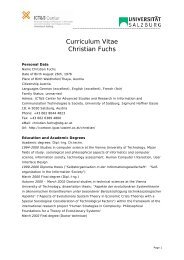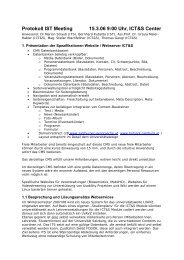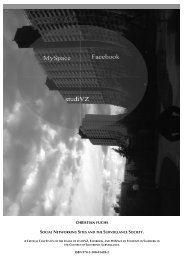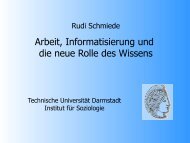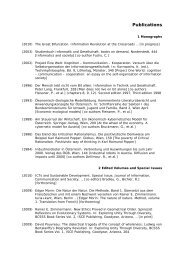ICTS AND SOCIETY: THE SALZBURG APPROACH - ICT&S
ICTS AND SOCIETY: THE SALZBURG APPROACH - ICT&S
ICTS AND SOCIETY: THE SALZBURG APPROACH - ICT&S
Create successful ePaper yourself
Turn your PDF publications into a flip-book with our unique Google optimized e-Paper software.
ICTs and Society: The Salzburg Approach<br />
source good and as monopolised commodity, in polity between e-democracy and<br />
Big Brother, and in culture between computer-supported wisdom and computersupported<br />
manipulation (Hofkirchner and Fuchs 2003, Fuchs 2003). Contradictions of<br />
the Internet can be identified on different scales from the individual to the world<br />
society, in different information contexts from cognition through communication to<br />
cooperation, and on different time and space scales.<br />
To take an example, there is the issue of open access. Knowledge that is produced<br />
by universities that pay the scientists for producing knowledge is, in the old paradigm,<br />
given away for free, that is, without gratification, to publishing houses to be<br />
published in peer-reviewed journals that, in turn, have to be bought back by the<br />
universities for their libraries. The Internet offers the technological potential of online<br />
journals that could rule out private publishing houses by open access. But publishing<br />
houses themselves discover the possibility of online journals and use it for<br />
better marketing. This is an antagonism in the interplay of different social subsystems<br />
like science, state, economy, to be found worldwide in the field of providing<br />
knowledge which serves a cognitive function as a current issue that may have mid-<br />
and long-term impacts. It is this very antagonism in its concrete manifestation that<br />
should form the object of a critical investigation.<br />
In the case of Web 2.0 Social Software, e.g., grassroots, or citizen, journalism follows<br />
the same logic. On the one hand, there is the possibility of the “act of a citizen,<br />
or a group of citizens, playing an active role in the process of collecting, reporting,<br />
analyzing and disseminating news and information. The intent of this participation<br />
is to provide independent, reliable, accurate, wide-ranging and relevant information<br />
that a democracy requires” (Bowman and Willis 2003, 9). Now this citizen<br />
journalism is commercialised in that traditional print media and broadcasting networks<br />
utilise it to add-up professional journalism.<br />
4.3 Tools<br />
If the tools of a science by means of the Information Society, that is, the enhanced<br />
possibilities of knowledge technologies (to be) provided by Information Society, are<br />
expected to allow for unity of knowledge while keeping a diversity of disciplines,<br />
transdisciplinarity in ICT&S Research cannot mean an unconditioned “anything goes”<br />
but an “anything goes, if it works”. As to the methods of ICT&S Research, there is<br />
no restriction of using and devising methods but the one: they must be appropriate<br />
for the study of the conditions that are crucial for the shaping of ICTs for a GSIS.<br />
This means that the definition of the object of study as cutting across a multiplicity<br />
of societal spheres including ecology and technology, of scales, of technologically<br />
mediated human information process categories, of spatio-temporal dimensions,<br />
rules out disciplinary approaches and entails transdisciplinarity.<br />
Furthermore, since the bringing about of a GSIS and the design of ICTs for this future<br />
is a complex task and since the challenges business, government, and civil society<br />
are facing in doing so are constituting a complex domain, the approach has<br />
Hofkirchner | Fuchs | Raffl | Schafranek | Sandoval | Bichler 36



